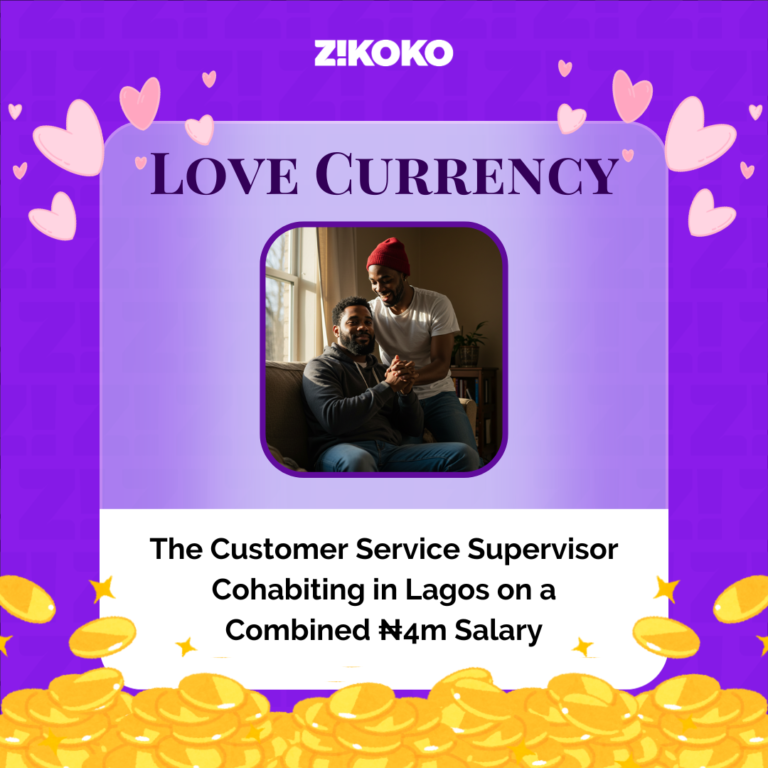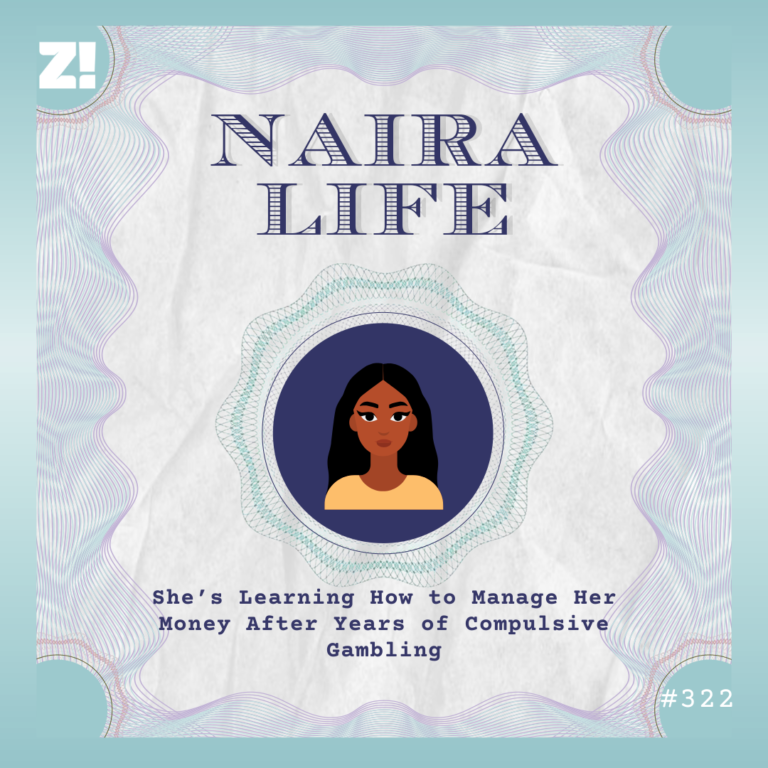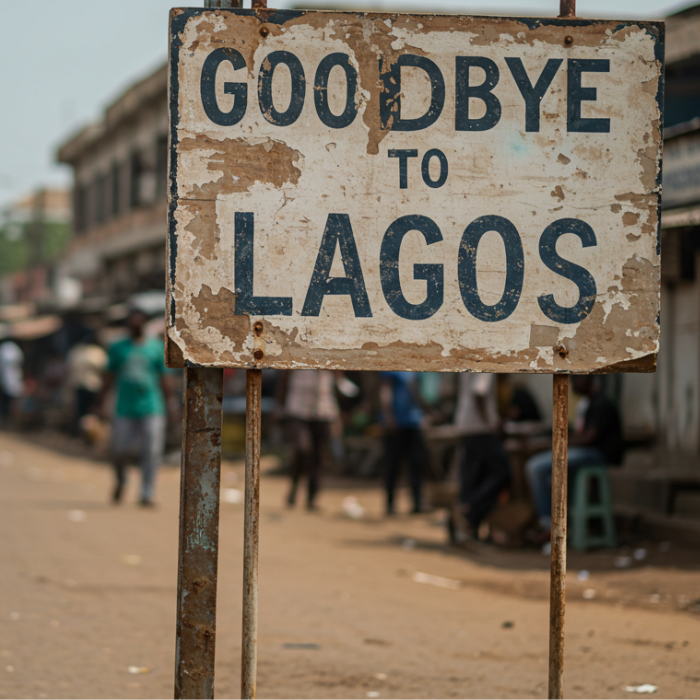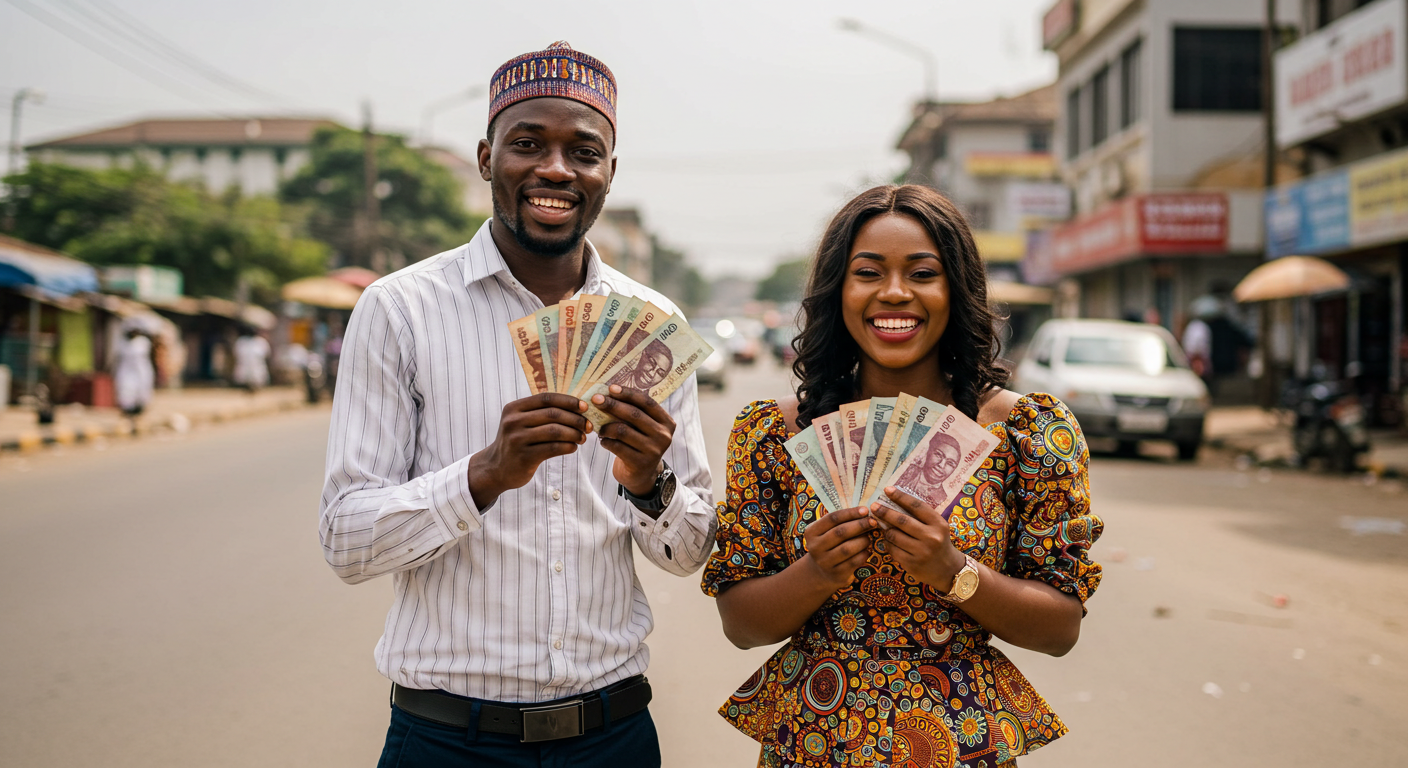Every week, Zikoko seeks to understand how people move the Naira in and out of their lives. Some stories will be struggle-ish, others will be bougie. All the time, it’ll be revealing.
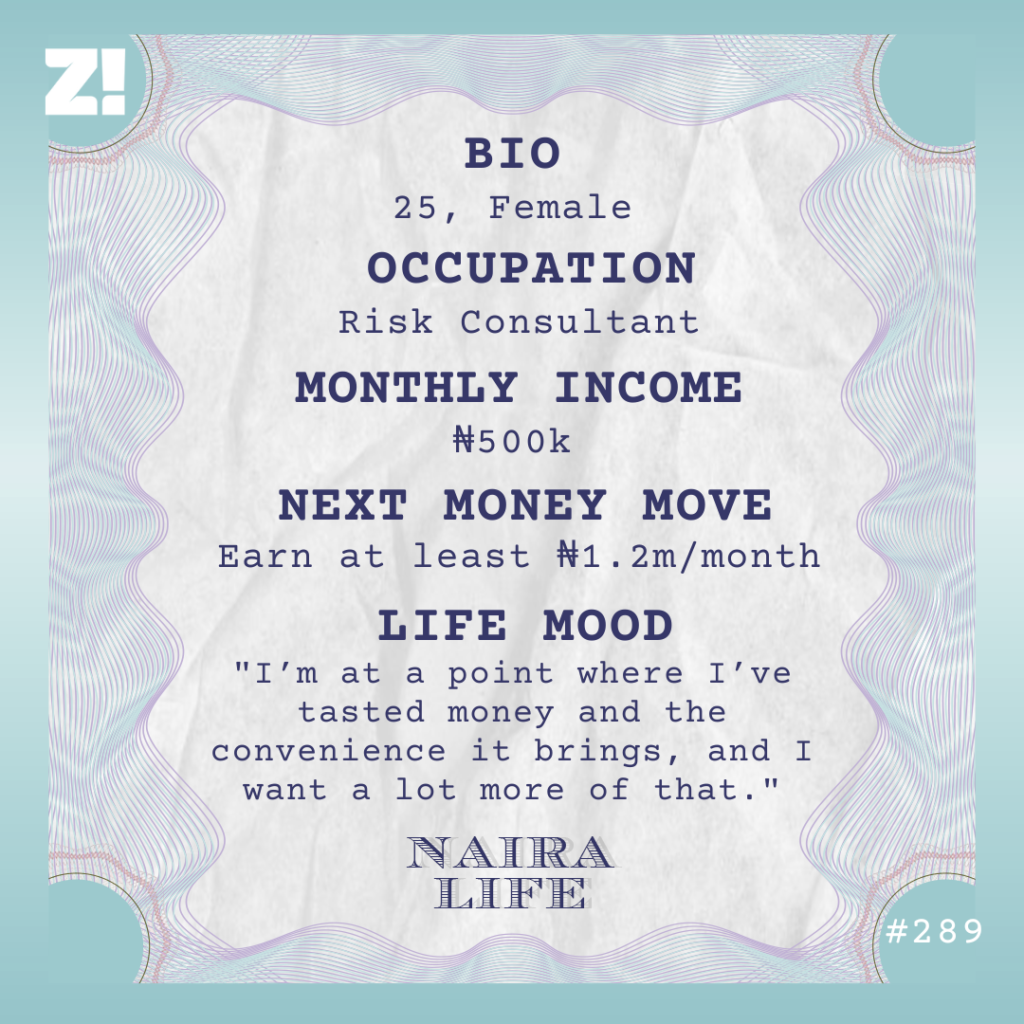
What’s your earliest memory of money?
In Primary 4, I noticed teachers would come to class to ask students who hadn’t paid their fees to stand up. While I never had to, some classmates always stood up every single time the teachers came.
It was my first indicator that money could separate you from the crowd. I didn’t know money was something people might not have.
It’s safe to say you grew up with money then
Kinda. My mum worked in finance, while my dad was a businessman who sold furniture materials, and they always sorted out my needs. I rarely requested anything that I didn’t get, whether it was a camera or a violin.
I got my first gold necklace in SS 2. All my classmates were surprised my parents got me actual gold, and I was just like, “If you also want gold, why not just ask your parents?”
SS 2 was also the first time I noticed my privilege. My class was going on an excursion, and my friend couldn’t attend because she couldn’t afford the ₦5k or ₦10k fee. It sounded unbelievable that she’d miss it because of money, and I convinced my parents to pay for her.
When did you first make money on your own?
I didn’t make real money until I became an adult. However, I made small change much earlier. I started charging my elder siblings about ₦500 to do their chores when I was in secondary school.
Oh, I once wrote a book and sold copies in JSS 1. This was around 2009, so I bought computer time at a cyber cafe, typed the story, and printed 10 copies. I sold only five copies, and each went for ₦150. I used my earnings to buy candy and a watch.
I did the chores-for-money thing throughout secondary school and only stopped when I moved out for uni in 2015.
Did you do anything for money while in uni?
I didn’t need to. I got a ₦20k monthly allowance plus whatever my siblings randomly sent me — I’m the last born. The major expenses like foodstuff were sorted at the beginning of the semester, so my allowance was primarily for any urgent need at school.
That said, I took on some ushering gigs for extra cash in my final year. It wasn’t a conscious effort to make money; Ushering was just what everyone did, and I did it for the fun— you know, to also feel like I belonged. The gigs paid between ₦3k – ₦5k, and I did them occasionally until I graduated in 2020. Then, I returned home and was stuck with nothing to do.
Ah. The pandemic year
After events re-opened, I took up two ₦3k ushering gigs to prove to myself that I could make money. But after standing for hours at the last gig, I decided I couldn’t be doing that as a graduate.
NYSC came in 2021, but I ghosted for the most part because I didn’t like the state I got posted to, and I wanted to stay close to family. The thing about Nigeria is, you can move anything as long as you have money. NYSC posted me to a school, but I settled my supervisor with ₦15k monthly out of my ₦33k allawee so I wouldn’t have to show up.
What did you do with all that free time?
I applied to proper jobs, and three months into my service year, I landed one as an auditor. My salary was ₦67k/month — my first big girl salary ever. I was so happy because I expected my first salary to be around ₦40k or ₦50k.
My main expenses were ICAN tutorial classes and handouts. My manager at work was fond of me, so he paid part of my exam fees, and my siblings handled the rest. I only paid about ₦50k of the ₦130k total cost from my own pocket.
I didn’t go past the first-level certification, though. I don’t like accounting, and I only took the exam because I was working in the field then. Maybe I shouldn’t have bothered because I was only at the job for eight months.
Did you find another job?
Yeah. I moved to a new role as a risk consultant at a multinational in the financial services industry, which I got by sending out a cold email to the recruiter. My starting salary was ₦220k/month.
The funny thing is, I didn’t even know this role existed before I got the job. But now I can’t imagine doing anything else. In school, I only heard you could work as a banker, lawyer, or doctor. I didn’t know what consulting meant until I found myself in financial services.
I’m curious. What does a risk consultant do?
I measure and mitigate risks for our various clients. That usually involves reviewing risk management policies, internal audit, and building new processes.
In summary, it’s just an unending cycle of meetings and tasks. But I mostly work from home, so that helps.
I imagine going from ₦67k to ₦220k was a pleasant jump
It was! I studied the credit alert for a full minute when I received my first salary. Just looking at the commas before and after three whole figures made me feel really good. I even took my friends to eat without looking at the prices on the menu, haha.
My lifestyle also changed a lot. I lived with my brother, so I only worried about my personal needs. Three months into the job, I got an iPhone for ₦250k.
Also, I’m an ambivert, but money made me start thinking about things that previously didn’t really matter to me. I started buying clothes and shoes every month and going out more. I’ve been to so many restaurants in Lagos, you wouldn’t even believe it.
Doings
In 2023, my employers reviewed salaries across the board, and I got promoted. So, my salary is now ₦500k/month.
You’d think I’d be a lot happier with the increased pay, but I’ve recently become scared of money — especially since the beginning of the year.
Let me guess, inflation?
Exactly. I rented my first apartment at ₦700k/year in 2023 and didn’t think much of it. It was just like, yeah, Nigeria is bad, but I’m still chilling.
The rent jumped to ₦1.5m this year. I had no choice but to pay because I couldn’t get something reasonable within the timeframe I had. Plus, I’d been saving money and could afford it, but it made me think about just how wild things have become. What happens when there’s another sudden price jump, and I can’t afford it? It’s not a nice feeling. My parents can still support me if the need arises, but I don’t want it to come to that.
I’ll be honest, though. Earning more has also majorly changed how I think about money these days.
Tell me more about that
I’m so much more conscious of money now, and it’s in two ways. Because of my work and industry, I know there’s so much money to make from working a 9-5. I once thought earning ₦50k was great, but I now know that there’s money, and you just need to be in the right circle and industry to make it.
On the other hand, I’m constantly on edge about running out of money or not having enough. I randomly battle thoughts like, “What if I don’t get money next month?” and it’s so wild because I literally have a job.
I blame it on inflation sha. I like the life my salary affords me, and I dread the day I’ll no longer be able to fund it. I like to have fun. I try new recipes to spark joy because there really isn’t much to look forward to in this life, but food will always be there. What if it gets to a stage where I can no longer afford the type of pasta I like?
I hate how conscious I am of money. I have it, but I’m scared of losing it, so I’m never really happy.
I feel you
I also understand that with money comes choice. Someone can decide they don’t feel inspired to work anymore and take a gap year because they can afford it. I don’t want to get to a point where I lose that choice or feel like I have to do things I’d rather not do because I can’t afford otherwise.
I might just be dramatic because my current financial situation doesn’t point to that at all. But with how volatile the country is, no one can really say for sure. Maybe I’m deeping it too much because of my industry, but I just want to have enough money to stay afloat if this country goes down the drain.
All this money talk makes me curious about your monthly expenses
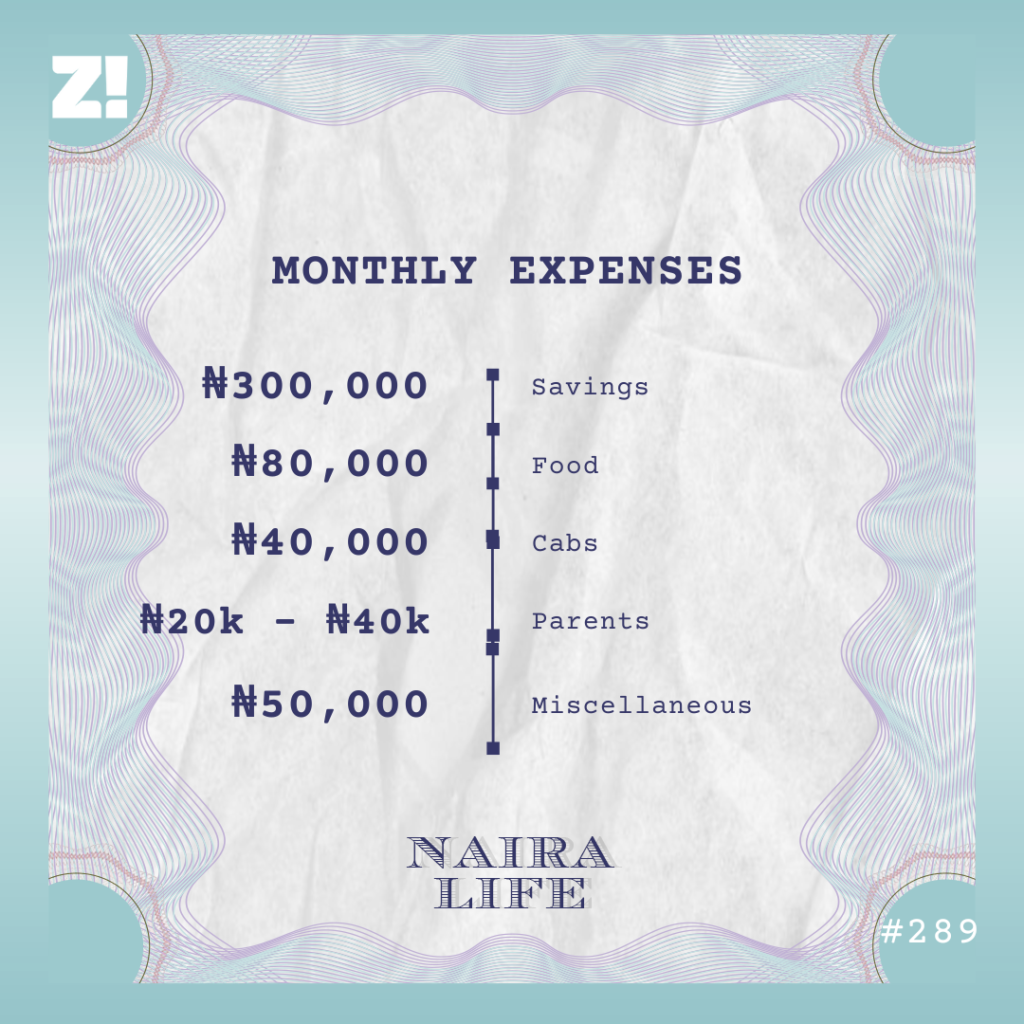
I don’t spend money on data because my employer covers it. Plus, I work remotely, so I hardly spend on transportation.
You budget ₦300k for savings monthly. How does that work?
I save in money market funds. I have a mutual funds account that I use to purchase treasury bills, commercial papers and equity savings. It’s essentially like I’m keeping my money in different instruments that bring interest. I can liquidate into actual cash every 30 days, but I just leave it there. My portfolio is worth ₦2.5m now. I also have a savings app where I keep emergency cash.
Do you have any financial regrets?
I wish I’d taken investments seriously earlier. My major challenge was navigating the risk that comes with it. Two years ago, all my colleagues were changing their naira to dollars and to me, it was like, what are these people doing? How can you not have naira? A dollar was about ₦600 then. Imagine if I’d also saved in dollars like they did.
I only started investing heavily this year because a senior colleague at work asked everyone to indicate if they had investments. I heard my colleagues share how they had real estate investments and other huge portfolios. I remember thinking, “I thought we were all managing life?”
LOL
I only had stocks at the time, and this senior colleague told me the stock market was too volatile. They were right — my stock portfolio is currently at a loss. But I haven’t liquidated my position because it can go back up someday.
Investing in stocks is a high-risk, high-reward situation. You can buy stocks worth a particular amount now and lose a substantial amount of it the next month.
Thankfully, this senior colleague also taught me the importance of conservative investments, which made sense. A manager introduced me to money markets, which work the same as a regular bank account. The only difference is that your money will actually grow. Plus, it’s not as risky as stocks. I also try diversifying my portfolio by using different institutions for the money market funds. I don’t have actual cash in my regular bank account.
Do you ever get anxious about not having money in your account?
I don’t. I think that’s because most of my assets are near-liquid; I can easily convert them if I have a serious emergency.
I also have rich friends. If the worst happens, I know I can easily ask them to loan me money while I figure things out.
That’s such a flex. Is there an ideal amount you think you should be earning?
Right now, at least ₦1.2m/month. I’m at a point where I’ve tasted money and the convenience it brings, and I want a lot more of that. That sounds selfish, but I don’t mind it. I want plenty of money, please. I want to live lavishly.
Is there anything you want right now but can’t afford?
A serviced apartment with a bigger kitchen. That would likely cost ₦2.5m – ₦3m, and I can’t afford that right now. I’d also like to visit Ghana, but I’m still pushing it to later in the year. That’ll cost about ₦800k.
How would you rate your financial happiness on a scale of 1 – 10?
7.5. I’m earning well for my age, but I’m still navigating this fear of losing money and not having enough. It’ll be a 10 when I earn enough not to be so scared anymore.
If you’re interested in talking about your Naira Life story, this is a good place to start.
Find all the past Naira Life stories here.


